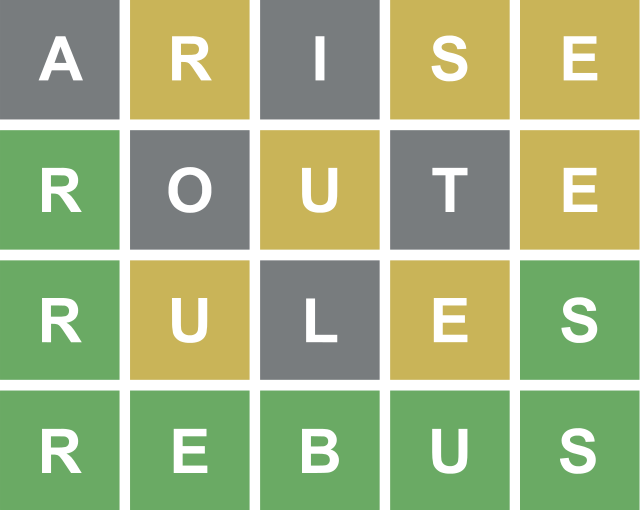Disclaimer! This is from Wordle 235, dated 09/02/22 and is not a spoiler.
I’m sure the majority of readers have come across Wordle, a 5 letter puzzle game where a word is presented daily to guess in 6 attempts. Then, once you find the word (or not), you can show your achievement of how few attempts it took on all social medias; with a pretty, spoiler-free “footprint” image of your playing history to boot.
A Quick History
Wordle was created by Josh Wardle, an American citizen, and subsequently has been bought by the New York Times as part of their games suite. Despite this, it is currently a huge hit in the UK. I am one of many who enjoys the daily challenge it presents. If you look at my Twitter page, the only things I presently post, are TER news and reviews (usually mine!) and Wordle results. Even my family, have a Whatsapp group called ‘Wordle Nerds’ where we post our results religiously and compare accordingly.

Wordle 235
On Wednesday, this week just passed, we British Wordle users were stopped in our tracks. As the answer to Wordle 235 was a 5 letter word in US English, but a 6 letter word in UK English. Cue twitter enragements. Including myself and my fellow writer Nick.

It was so poorly received, that a “British” version of the game; called Wourdle, was born; with its first word being, you guessed it, the 6 letter word in question. Even the British embassy in the US had their say!

There Is A Point To This I Swear
Ok… rant over. Some readers are probably thinking; “its an American-born game, just suck it up and move on”. But I disagree. If a game is so popular in the UK, surely the chooser of the daily word should be more mindful of our language differences? Also, according to his wikipedia page, Josh Wardle is UK born and spent time studying at university here.
Back in February, a similar issue occured with Wordle 207, however between then and Wordle 235, UK engagement has rapidly increased, hence the larger volume in outcry compared to previous.
My point is, that as game designers, we need to be considerate and respectful of the complexity of the English language when designing word-based puzzles and conundrums. I myself will hold my hands up in failing to acknowledge this, in my previous escape game AIRLOCK.
One of the puzzles designed, included a horoscope page from a newspaper that had letters circled, spelling out the phrase:
“Ten and three, focus on the tears and the spaces you see”.
Pages ten and three in the clue document; given to the team at the start in the game, had rips in them, highlighting the tears in the sentence above. The problem is, tears can be pronounced as tairs, as intended… or tee-ars; as in the tears of someone crying.
Guess what around 90% of teams initially prounounced it as…
Then, guess how long on average it took players to realise to pronounce it differently… about 7 minutes per team on average of a 60 minute timed game, lost on a pronounciation trap.
Whilst designing the game, I never considered the double pronounciation of the word. Now looking retrospecively, I feel it should have been signposted better, to evade the inevitable trap. Or alternatively, scrap the puzzle entirely.
In Conclusion
I feel as game designers, we need to cater to our audience fairly and not provide them with pitfalls to fall in, that can make them feel silly; intentional or otherwise. Hopefully the Wordle team have taken this on board; due to the reaction from Wordle 235, and as a result; create an experience that is universally fair, for all users of the confusing and goal-post-shifting English language.

